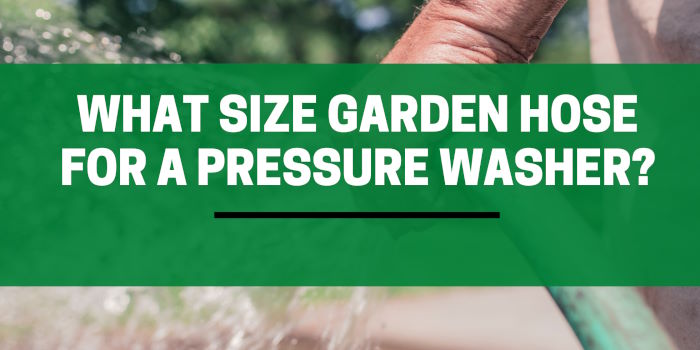
The optimal power of a pressure washer greatly depends on the right size of a garden hose. As you aim to maximize the efficiency of your washer, understanding the hose’s diameter size and length becomes vital.
This guide will detail how to select the right size suitable for a pressure washer.
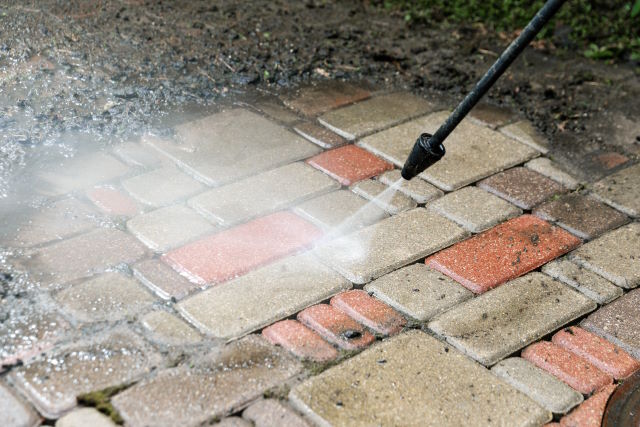
Contents
Gauging the Right Diameter
Daily watering tasks typically use a standard 3/4-inch diameter hose. For more demanding tasks, such as connecting to a pressure washer, there’s a key difference in the required water flow.
5/8-Inch Diameter Hoses: An Everyday Essential
The 5/8-inch diameter hose is a common choice for many homeowners, primarily because of its versatile application.
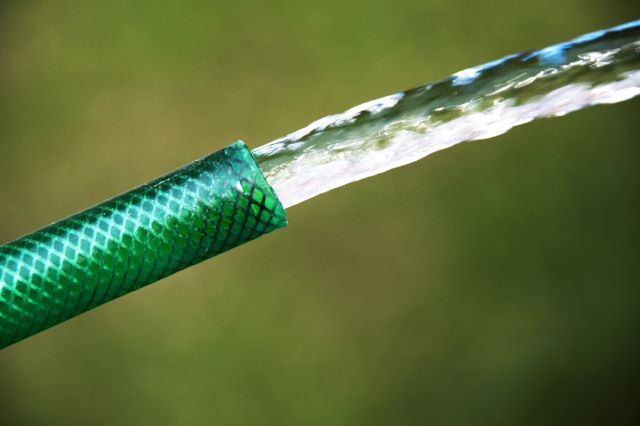
Why Choose a 5/8-Inch Hose?
- High GPM Flow Rate: With an internal diameter of 5/8-inch, this hose allows water to flow at a faster velocity. This makes it ideal for daily watering or even washing cars.
- Adequate Water Flow: At 50 psi, a 25-foot 5/8-inch hose can provide an impressive flow rate of 48 gallons per minute, while a 50-foot hose offers 24 gallons per minute.
- Versatility: This size can be attached to various electric pressure washers, making it suitable for diverse cleaning tasks.
- Affordability and Availability: Due to its common size, it’s readily available in both online and local stores and usually at a reasonable price.
- Efficiency: It offers less resistance during water flow, ensuring a continuous and powerful stream for your tasks.
Best Uses: Watering plants on balconies, washing cars, outdoor furniture, and other standard cleaning tasks.
3/4-Inch Diameter Garden Hose: The Commercial Grade Power
The 3/4-inch diameter garden hose is known for its higher water pressure, making it a go-to option for more demanding tasks.
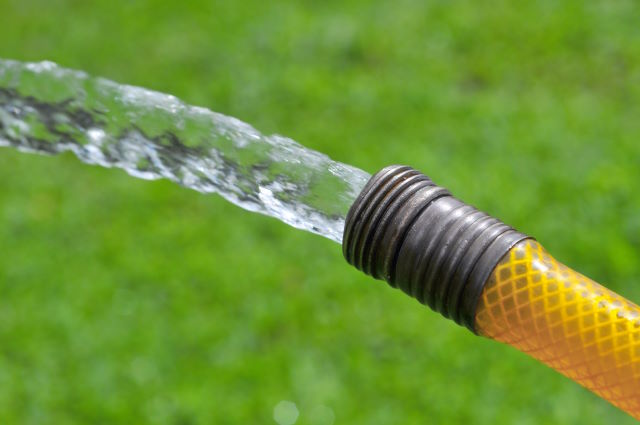
Why Choose a 3/4-Inch Hose?
- Superior GPM Flow Rate: It provides a higher water flow, with a 25-foot hose giving an output of 80 gallons per minute at 50 psi.
- Durability: Due to its wider diameter and more material, this hose offers enhanced durability compared to the 5/8-inch variant.
- Perfect for Commercial Tasks: Its power and water volume make it ideal for commercial tasks, from heavy-duty gardening to filling up swimming pools.
- Price Consideration: Given its features and benefits, the 3/4-inch hose comes with a slightly higher price tag.
Best Uses: Commercial tasks, watering large lawns, filling pools, and cleaning large machinery or trucks.
1 1/4-Inch Diameter Garden Hose: Specialized and Efficient
Although lesser-known, the 1 1/4-inch garden hose packs a punch and is specialized for specific tasks.
Why Choose a 1/4-Inch Hose?
- Maximized Pressure Output: It offers the strongest flow rate, making it ideal for tasks requiring high-pressure water.
- Specialized Use: Its main function is more towards cleaning rather than watering, ensuring a stronger flow and maximum pressure.
- Durability and Premium Price: The 1 1/4-inch hose is highly durable, but it may come at a premium price.
Best Uses: Primarily commercial and high-end residential tasks.
- 3/4-inch Garden Hose: Suitable for watering plants and washing cars. It’s a common size and works as a standard hose for many households.
- 1-inch Hoses and Beyond: These are larger diameter hoses that cater to the needs of an electric pressure washer and more commercial tasks. The 1 1/4 inch garden hose, for instance, can handle a GPM flow rate and a pressure water output of up to 2000 PSI. It ensures an adequate water flow without compromising on the pressure.
Considering the Length
The length of your garden hose determines the extent of freedom and reach you’ll have. Choosing the right length depends on whether you’re washing in your driveway, around the entire house, or targeting a second story. Remember, a longer hose might sometimes result in pressure loss, so balance is the rule of thumb.
Making the Right Connections
It is imperative to select a garden hose with fittings that align seamlessly with your pressure washer specifications. The majority of pressure washers come equipped with the industry-standard 3/4-inch GHT (Garden Hose Thread) connectors.
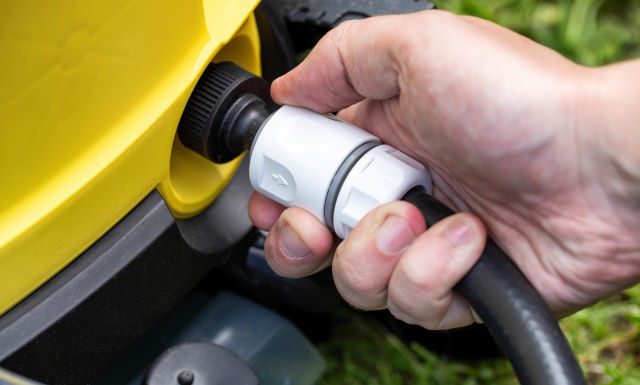
Ensure your chosen hose has congruent connectors. Should there be any discrepancy, procure the appropriate adapter to bridge the gap.
The types of connections can vary from Male M22 or female M22, to quick-connect plugs such as the Male QC plug and the Female QC plug.
Ensure you have the right connection, as the wrong one might impact the flow of water and the overall efficiency.
Material Matters
A high-quality hose is determined by its material.
- PVC Plastic Hoses: Common and hardy, but less flexible. PVC or vinyl hoses are often the choice for those on a budget.
- Rubber Hoses: More flexible than PVC and less prone to kinks. However, they can leave black streaks on some surfaces during usage.
- Polyurethane Hoses: The best of both worlds. These hoses provide the flexibility of rubber without the marking, making them ideal for commercial and professional applications.
All of the above materials are suitable. But rubber and polyurethane will be seen by more commercial uses and generally have longer life.
Optimum Performance with the Right Hose Size
Understanding the difference between a regular hose used for daily watering and one suited for an electric pressure washer is crucial. While the internal diameter is a crucial factor, the hose material and length also play a significant role.
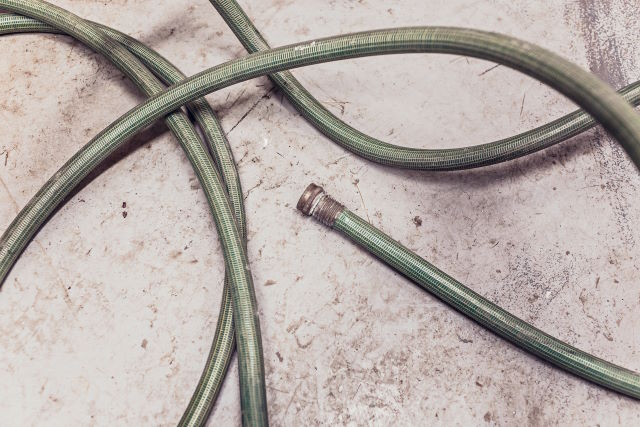
For instance, the larger diameter hose, like the 3/8-inch option, offers a powerful stream perfect for commercial tasks. On the other hand, the 5/8-inch diameter hose, while common, may not provide the same power washing intensity.
Final Thoughts
Finding the correct size and type of hose for your pressure washer is more than just matching connections. It’s about ensuring maximum pressure, an adequate supply of water, and optimum performance.
From types of nozzles to power washer hose materials, each aspect contributes to the efficiency of your cleaning tasks.
Always remember, whether you’re dealing with standard garden hose sizes or specialized pressure washer hose sizes, ensuring the right fit and type is paramount for safety and efficiency.
With this knowledge in hand, you’re better equipped to select the perfect hose for your pressure washer.
